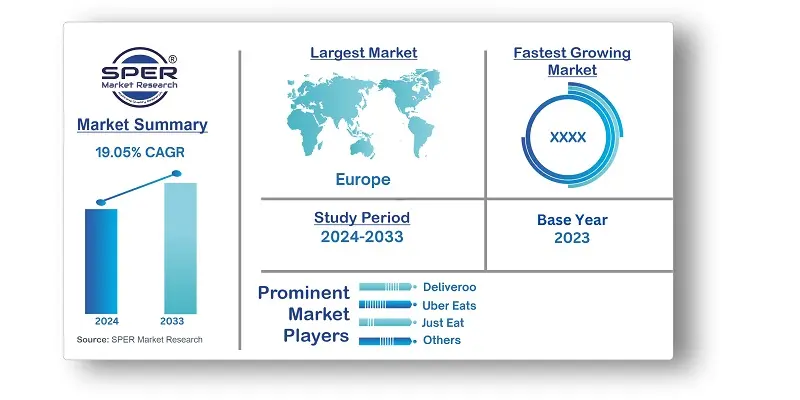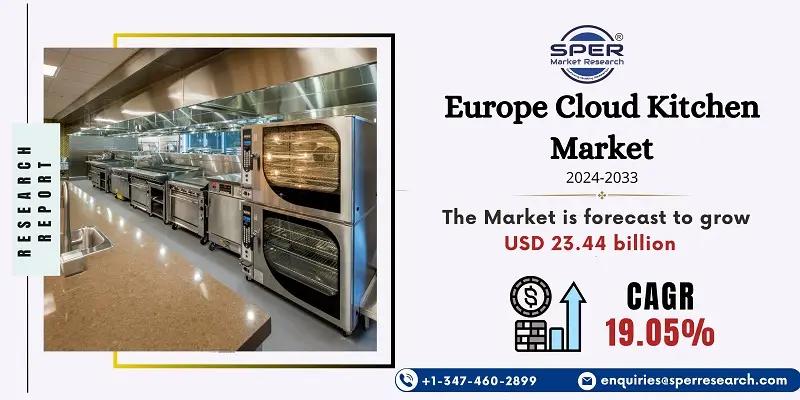
Europe Cloud Kitchen Market Growth, Size, Trends, Share, Demand. Revenue and Future Outlook
Europe Cloud Kitchen Market Size– By Type, By Nature of Kitchen, By Offering- Regional Outlook, Competitive Strategies and Segment Forecast to 2033
| Published: Aug-2024 | Report ID: FOOD2491 | Pages: 1 - 159 | Formats*: |
| Category : Food & Beverages | |||
- Deliveroo opened its first Editions locations in the UK in January 2021. These enormous kitchens, which are exclusively for deliveries, have a variety of restaurant brands under one roof. This increases Deliveroo's virtual kitchen footprint.
- Uber Eats opened approximately 1,000 virtual kitchens across Europe, the Middle East, and Africa in June 2020 to satisfy growing food delivery demand. This helps Uber Eats' distribution infrastructure.


| Report Metric | Details |
| Market size available for years | 2020-2033 |
| Base year considered | 2023 |
| Forecast period | 2024-2033 |
| Segments covered | By Type, By Nature of Kitchen, By Offering |
| Regions covered | Germany, France, Italy, UK, Russia, and the Rest of Europe |
| Companies Covered | Deliveroo, Uber Eats, Just Eat, Kitchen United, Kitopi, Travis Kalanick, Karma Kitchen, Kitchen Hub, REEF Technology, DoorDash. |
- Food Delivery Services
- Restaurant Chains and Start-ups
- Investors and Venture Capitalists
- Technology Providers
- Consumer Goods Companies
- Logistics and Supply Chain Companies
- Real Estate Developers
| By Type: |
|
| By Nature of Kitchen: |
|
| By Offering: |
|
- Europe Cloud Kitchen Market Size (FY’2024-FY’2033)
- Overview of Europe Cloud Kitchen Market
- Segmentation of Europe Cloud Kitchen Market By Type (Independent Cloud Kitchen, Commissary/Shared Kitchen, Kitchen PODs, Food Truck, Incubator Kitchens, Other)
- Segmentation of Europe Cloud Kitchen Market By Nature of Kitchen (Franchised Cloud Kitchen, Standalone Cloud Kitchen, Chain Cloud Kitchen, Virtual Restaurant)
- Segmentation of Europe Cloud Kitchen Market By Offering (Food Preparation, Order Management, Food Delivery, Marketing, Data Analytics, Others)
- Statistical Snap of Europe Cloud Kitchen Market
- Expansion Analysis of Europe Cloud Kitchen Market
- Problems and Obstacles in Europe Cloud Kitchen Market
- Competitive Landscape in the Europe Cloud Kitchen Market
- Impact of COVID-19 and Demonetization on Europe Cloud Kitchen Market
- Details on Current Investment in Europe Cloud Kitchen Market
- Competitive Analysis of Europe Cloud Kitchen Market
- Prominent Players in the Europe Cloud Kitchen Market
- SWOT Analysis of Europe Cloud Kitchen Market
- Europe Cloud Kitchen Market Future Outlook and Projections (FY’2024-FY’2033)
- Recommendations from Analyst
1.1. Scope of the report1.2. Market segment analysis
2.1. Research data source2.1.1. Secondary Data2.1.2. Primary Data2.1.3. SPER’s internal database2.1.4. Premium insight from KOL’s2.2. Market size estimation2.2.1. Top-down and Bottom-up approach2.3. Data triangulation
4.1. Driver, Restraint, Opportunity and Challenges analysis4.1.1. Drivers4.1.2. Restraints4.1.3. Opportunities4.1.4. Challenges4.2. COVID-19 Impacts of the Europe Cloud Kitchen Market
5.1. SWOT Analysis5.1.1. Strengths5.1.2. Weaknesses5.1.3. Opportunities5.1.4. Threats5.2. PESTEL Analysis5.2.1. Political Landscape5.2.2. Economic Landscape5.2.3. Social Landscape5.2.4. Technological Landscape5.2.5. Environmental Landscape5.2.6. Legal Landscape5.3. PORTER’s Five Forces5.3.1. Bargaining power of suppliers5.3.2. Bargaining power of buyers5.3.3. Threat of Substitute5.3.4. Threat of new entrant5.3.5. Competitive rivalry5.4. Heat Map Analysis
6.1. Europe Cloud Kitchen Market Manufacturing Base Distribution, Sales Area, Product Type6.2. Mergers & Acquisitions, Partnerships, Product Launch, and Collaboration in Europe Cloud Kitchen Market
7.1. Europe Cloud Kitchen Market Size, Share and Forecast, By Type, 2020-20267.2. Europe Cloud Kitchen Market Size, Share and Forecast, By Type, 2027-20337.3. Independent Cloud Kitchen7.4. Commissary/Shared Kitchen7.5. Kitchen PODs7.6. Food Truck7.7. Incubator Kitchens7.8. Other
8.1. Europe Cloud Kitchen Market Size, Share and Forecast, By Nature of Kitchen, 2020-20268.2. Europe Cloud Kitchen Market Size, Share and Forecast, By Nature of Kitchen, 2027-20338.3. Franchised Cloud Kitchen8.4. Standalone Cloud Kitchen8.5. Chain Cloud Kitchen8.6. Virtual Restaurant
9.1. Europe Cloud Kitchen Market Size, Share and Forecast, By Offering, 2020-20269.2. Europe Cloud Kitchen Market Size, Share and Forecast, By Offering, 2027-20339.3. Food Preparation9.4. Order Management9.5. Food Delivery9.6. Marketing9.7. Data Analytics9.8. Others
10.1. Europe Cloud Kitchen Market Size and Market Share
11.1. Europe Cloud Kitchen Market Size and Market Share By Region (2020-2026)11.2. Europe Cloud Kitchen Market Size and Market Share By Region (2027-2033)11.3. Germany11.4. France11.5. Italy11.6. UK11.7. Russia11.8. Rest of Europe
12.1. Deliveroo12.1.1. Company details12.1.2. Financial outlook12.1.3. Product summary12.1.4. Recent developments12.2. Uber Eats12.2.1. Company details12.2.2. Financial outlook12.2.3. Product summary12.2.4. Recent developments12.3. Kitchen United12.3.1. Company details12.3.2. Financial outlook12.3.3. Product summary12.3.4. Recent developments12.4. Kitopi12.4.1. Company details12.4.2. Financial outlook12.4.3. Product summary12.4.4. Recent developments12.5. Travis Kalanick12.5.1. Company details12.5.2. Financial outlook12.5.3. Product summary12.5.4. Recent developments12.6. Karma Kitchen12.6.1. Company details12.6.2. Financial outlook12.6.3. Product summary12.6.4. Recent developments12.7. Kitchen Hub12.7.1. Company details12.7.2. Financial outlook12.7.3. Product summary12.7.4. Recent developments12.8. REEF Technology12.8.1. Company details12.8.2. Financial outlook12.8.3. Product summary12.8.4. Recent developments12.9. DoorDash12.9.1. Company details12.9.2. Financial outlook12.9.3. Product summary12.9.4. Recent developments12.10. others
SPER Market Research’s methodology uses great emphasis on primary research to ensure that the market intelligence insights are up to date, reliable and accurate. Primary interviews are done with players involved in each phase of a supply chain to analyze the market forecasting. The secondary research method is used to help you fully understand how the future markets and the spending patterns look likes.
The report is based on in-depth qualitative and quantitative analysis of the Product Market. The quantitative analysis involves the application of various projection and sampling techniques. The qualitative analysis involves primary interviews, surveys, and vendor briefings. The data gathered as a result of these processes are validated through experts opinion. Our research methodology entails an ideal mixture of primary and secondary initiatives.



Frequently Asked Questions About This Report
PLACE AN ORDER
Year End Discount
Sample Report
Pre-Purchase Inquiry
NEED CUSTOMIZATION?
Request CustomizationCALL OR EMAIL US
100% Secure Payment






Related Reports
Our Global Clients
Our data-driven insights have influenced the strategy of 200+ reputed companies across the globe.




















